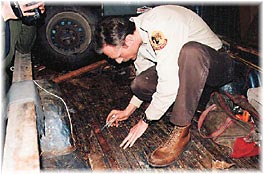 This recreational hunting regulations tighten to reflect more intense management practices and landowners become more reluctant to allow hunting on their property, both groups are reporting a worrisome trend. Unscrupulous hunting parties comprised of natives and non-natives are joining forces to conduct illegal activities for their mutual benefit.
This recreational hunting regulations tighten to reflect more intense management practices and landowners become more reluctant to allow hunting on their property, both groups are reporting a worrisome trend. Unscrupulous hunting parties comprised of natives and non-natives are joining forces to conduct illegal activities for their mutual benefit.
Many witnesses of these types of activities feel helpless to act. They believe that Treaty Indians are totally unfettered by conservation legislation and that a willingness to make false claims as to the involvement of non-natives also puts those individuals beyond the reach of the law. For that reason witnesses are reluctant to report such activities to the authorities.
Although century-old treaty agreements make enforcement today difficult, it is by no means impossible when the investigating officer is dedicated, competent and persistent. The following investigation is a case in point.
In 1995, officers in the Olds district began receiving information which led them to believe a significant number of big game animals were being killed out of season in the surrounding area. When the sites were investigated, evidence indicated that they were "Indian kills." On several occasions during that winter and spring, persons travelling in the vicinity reported seeing two individuals butchering animals in the ditch and loading them onto a small blue pickup truck. One witness was able to provide a partial plate number; a second was able to complete that number. A check of the registered owner pointed to Joseph Herbert Adams of Calgary. He was not a treaty Indian.
Officer Clarke Merriman, then stationed in Calgary, received the information and initiated an investigation that would take three years to conclude and one that would lead him once again into the murky underworld of native/non-native poaching for profit.
Merriman ran the usual records checks on Joseph Adams, or "Herb," as he preferred to be called and on Oct. 13, 1995 he contacted this individual by phone. He apprised Adams of the allegations and provided him an opportunity to address them. Adams admitted that his vehicle had been in the area but was simply, "helping out a native guy". He identified the native in question as Fineday (Frank) Crookedlegs also of Calgary. Having heard this story before, Merriman contacted Crookedlegs and arranged to have he and Adams provide statements describing their activities in the Olds area. Initially their story was that Adams was not present at all and that Crookedlegs had borrowed the vehicle on the days in question to hunt for food.
Believing that he had sufficient evidence to proceed with charges despite the statements, Merriman drove to Crookedlegs' residence to serve him with a summons. When he arrived he found Adams and his vehicle there. He asked for and was given permission to search the vehicle and found and collected evidence to indicate that it had been used to transport wildlife.
Using the information provided by the suspects, Merriman once again interviewed witnesses in the Olds area. Joseph Herbert Adams was definitely as the second person present with Crookedlegs on at least one occasion where an animal was butchered. A second break came in January 1996. A confidential informant came forward alleging that a Caucasian male driving a vehicle bearing the license plate belonging to Joseph Herbert Adams attempted to sell that person big game meat. When these and other facts were put to Crookedlegs and his defense counsel, a more accurate description of Adams' involvement was provided.
Armed with this information Officer Merriman succeeded in obtaining a search warrant for Adams' residence and vehicle. A number of seizures were made, including the vehicle itself. Tom Packer, forensic biologist with Natural Resources Service, traveled to Calgary and collected numerous samples for DNA analysis.
 |
Tom Packer, with Natural Resources Service, assisted in the search by collecting evidence from the vehicle for DNA analysis.
|
Adams was charged with a total of 20 counts under the Wildlife Act, including hunting during a closed season, illegal possession of wildlife and trafficking in wildlife. Crookedlegs could have been charged with identical counts, however, upon determining his actual benefit from the illegal activities, he was charged with wastage and providing false information to a wildlife officer. He was convicted of the latter, the first charge was withdrawn and he paid a fine of $100. He was also retained as a principal witness against Adams. Adams' vehicle was subsequently returned to him, at which time he promptly dropped from the face of the earth. He failed to appear in court and a warrant was issued for his arrest.
The charges were kept alive for the following three years during which time Crime Stoppers ran a photo of Adams with the hope that someone would recognize him and report his whereabouts. Eventually an individual matching his description who was involved in suspicious wildlife-related activities was reported to a Calgary district officer and he was subsequently arrested.
On Sept. 22, 1998 the matter was finally dealt with. Of the original twenty charges, Adams plead guilty to two counts of hunting during a closed season and one count of hunting without a license. He was sentenced to pay a $3,000 fine. A stay of proceedings was entered on trafficking charges. Anyone observing what they believe to be a wildlife offence, regardless of whether or not they feel something can be done, is encouraged to report it.
S.W.H. Webb is a member of the Alberta Fish and Wildlife Officers Association in Calgary.